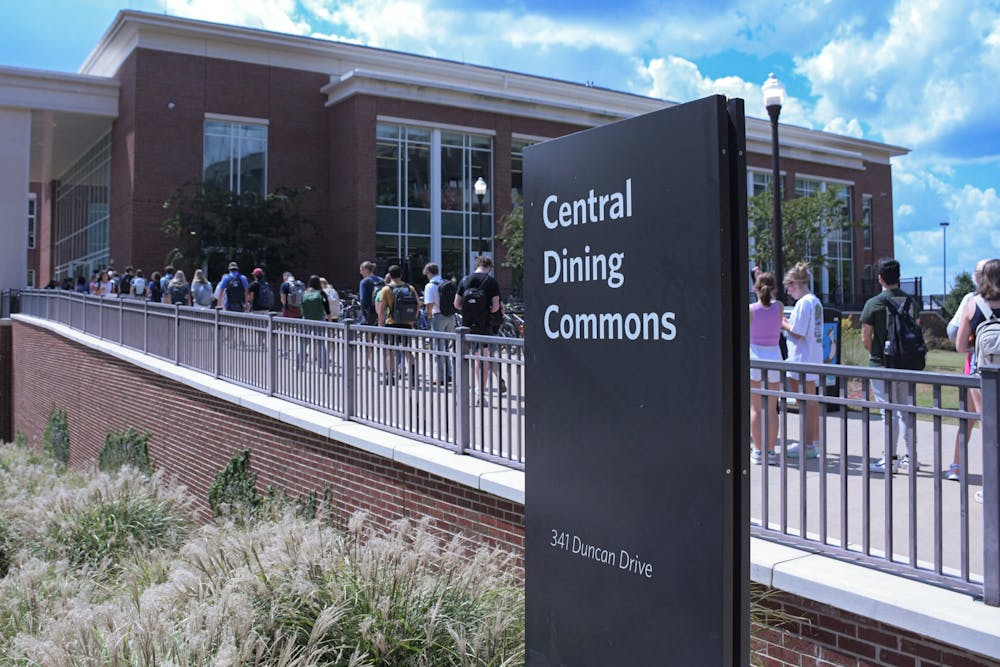Auburn University is bringing more sustainability to its campus as composters and reusable to-go containers become the newest addition.
Going on his thirteenth year at Auburn, Glenn Loughridge, Director of Campus Dining and Concessions, shared his environmentally friendly efforts. As an Auburn graduate, he wanted to make his impact on the Auburn Family special.
The composter that Auburn has can break down up to 2,000 pounds of waste a day. With a plan to eventually add one to the Wellness Kitchen, Loughridge expressed that the current goal is to target the two major dining halls.
"We expect that there is the potential to divert somewhere between 100,000 and 150,000 pounds, a semester, of food waste that would have gone into the landfill. It's a significant opportunity as a campus," Loughridge said.
Auburn sets aside a certain amount of money each year, called a mission enhancement grant, for faculty and staff projects that will enhance the university. Partnering with poultry sciences on the mission enhancement grant, Loughridge shared that dining matched around $200,000 worth of funds, and the overall project was $450,000.
"The composter is very high-tech. One of the things we feel like was critical to what we feel will be the long-term success, is that it is end to end," Loughridge said.
All of the food waste goes through a mulching process, which grinds up the waste, and it gets transferred into the composter. When waste exits the composter, there are a few things to focus on. When compost goes in, it is crucial to make sure the inside is hot enough so that there are no foodborne pathogens that can come through the system. The compost is eventually turned into soil to help the university grow plants.
"It's a great system and we plan for the ability to grow more food for campus. I think that's the great part, we're returning what would've been food waste, into a product," Loughridge said.
Dr. Desmond Layne, department head and professor of horticulture, Daniel Wells, associate professor of horticulture and Jack Maruna, consulting project manager, are key partners in keeping the system flowing.
Sixteen acres of land between the Office of Information Technology and the Gogue Performing Arts Center are set to showcase the work of Auburn’s horticulture program. In addition to the 6-container indoor farms, a children's garden within a greenhouse is the next step.
Auburn's horticulture program grows between 100 and 150 pounds of spring mix. Some produce options include romaine lettuce, tomatoes and cucumbers. Loughridge plans to expand those numbers in the upcoming year to 600 pounds a week, with the indoor containers upgrading from two to six. All of the spring mix that is grown will be served at The Edge at Central Dining. He hopes the possibility of catering is also in the near future.
"More of our students will be able to experience lettuce that is grown on-campus and delivered same day. It is pretty special," Loughridge said.
One idea piloted this year was Foy on the Fly, which emphasizes the idea of reusable containers and encourages students to practice sustainability. Trying to eliminate as many containers as possible, the idea of making them single-use is hopeful to spread to other locations on campus. Next semester, campus dining plans to add the reusable containers at Tiger Zone and the Wellness Kitchen.
The Foy location has diverted 37,000 containers with a 98% return rate. Using Reuse Pass, there is a sign-up on Grubhub that reminds students to bring the container back.
"The great news is when we add, say the Tiger Zone and Wellness Kitchen, hopefully next year, then that's two more locations where you can drop your box off," Loughridge said.
He expressed that one of the first friendly faces he saw when he arrived at Auburn was Mike Kensler, Director of the Office of Sustainability. Loughridge shared that a lot of what he has been able to accomplish, as it pertains to sustainability, has been because of Kensler.
"Throughout the years he's been an amazing mentor, friend and fellow dreamer of what the Auburn food system could become," Loughridge said.
FoodYou is a partnership with the College of Agriculture. It is the concept that there is a food system on campus that mimics a small city's. By growing food on campus, it is demonstrating that it can be integrated into dining halls.
"At the dining halls, we donate unserved food to campus kitchens, which is another waste trade we could potentially have. That food can come in and feed students and other folks in the community who are food-insecure. We donate somewhere around 35,000 pounds a year, which is very significant," Loughridge said.
As far as looking to the future, Loughridge shared that they are communicating with the state of Alabama about how to procure more food from farmers within the state. With challenges in producing food in the middle of winter, he said they are inquiring about doing further processing on campus involving flash-freezing and harvesting for the next season.
"We're looking for new ways to source more of our produce within the state. Our contract we have with our vendor states that we want 20% of our purchases to be local and we define that as within the state of Alabama or within 20 miles of campus. So, we're really pushing to make sure we're meeting those goals and we really love to meet that whole 20% within the state because we do want to support our farms," Loughridge said.
Loughridge encourages interested students with sustainability ideas to get involved and participate in making Auburn's campus more eco-friendly.
Do you like this story? The Plainsman doesn't accept money from tuition or student fees, and we don't charge a subscription fee. But you can donate to support The Plainsman.





